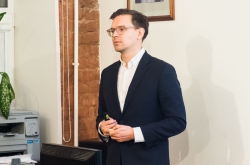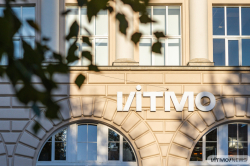AI for science: from predicting ice movement to creating treatments and artificial organs
Nikolay Nikitin, PhD in engineering, the head of a frontier laboratory at ITMO’s Research Center “Strong AI in Industry” and the leader of ITMO OpenSource community, became the winner in the category Young Academic Supervisors. Together with his students Nikita Starodubtsev, Lyubov Yamshchikova, Maya Pinchuk, Yulia Borisova, and Gleb Solovyev, Dr. Nikitin developed an open-source ecosystem of ML methods and algorithms for researchers. Thanks to these tools, it’s possible to automate the applications of AI in tasks from various fields. Importantly, the ecosystem is available to everyone and used by researchers from ITMO, Russia, and around the world.
With the repositories included in the pack, it’s possible to provide a deeper interpretation of data for a wide range of research and industrial tasks: predicting substance properties in chemistry or weather in hydrometeorology; modeling data from tech systems sensors; or explaining why parts of a molecule are responsible for its various properties.
The ecosystem is already used in real-life cases. For instance, in collaboration with researchers from the Tsinghua-Berkeley Shenzhen Institute, ITMO scientists have designed an artificial spleen on a chip, as well as applied machine learning for Arctic ice forecasting. In collaboration with ITMO’s ChemBio Cluster, the researchers created an algorithm that will make the development of new drugs and their compression into tablets simpler and cheaper. And the collaboration with the International Laboratory of Biomechatronics and Energy-Efficient Robotics (BE2R Lab) resulted in improved efficiency of the design process for robotic manipulators.
“With automated machine learning, experts – whose time is highly expensive – can save many hours of work: a data scientist can develop a model in half an hour. Moreover, it is fundamentally important to implement AI tools as open-source solutions, as this increases the reproducibility of scientific research. Next year, my team and I are planning to explore multi-agent systems based on large language models to automate the solution of various complex tasks in industry and science. We will also create an open library for this purpose and share our results,” shares Nikolay Nikitin.

Nikolay Nikitin. Photo by Dmitry Grigoryev / ITMO.NEWS
Algorithms for generating images and vector graphics
Another winner in the track Young Academic Supervisors was Valeriia Efimova, PhD in engineering, a senior researcher and deputy head of the International Laboratory “Computer Technologies,” and key lecturer at the Master’s program Deep Learning and Generative AI. For the past two years, Dr. Efimova has headed the lab’s computer vision department in addition to supervising more than 20 students. Under the researcher’s guidance, the students have written two research papers that were accepted to A-level conferences, GECCO and PPSN, and presented their work at CVPR, an A*-ranked conference.
Dr. Efimova studies the application of large language models for generating vector graphics, including industrial equipment blueprints and graphic design materials based on text prompts. Additionally, Valeriia Efimova has developed three courses on deep learning and image generation. Winning the Yandex ML Prize will enable her and her research teams to train neural networks in cloud environments, significantly accelerating their research: for example, training a model will now take just over a week, instead of a month.
“Next, I’m planning to continue my research in vector graphics generation, dataset augmentation (increasing the number of training images), and exploring neural network architectures for computer vision. I would like to conduct more fundamental research that brings practical benefits to industry. For example, my research will help identify defects in manufactured products, generate blueprints of equipment and components, automate AI development, and improve the quality of neural network predictions,” emphasizes Valeriia Efimova.

Valeriia Efimova with her students. Photo courtesy of the subject
Machine learning courses
In the category ML Educators, the ML Prize was awarded to Alexey Shpilman, PhD in Engineering, an ITMO professor and the managing director in the Technological Development department at Sberbank. He has developed several open-source courses in machine learning.
In the past eight years, the main course, Introduction to Machine Learning, has been completed by over 500 students. Moreover, Dr. Shpilman has delivered courses in deep learning, reinforcement learning, and information retrieval. Several years ago, in collaboration with PhD student Oleg Svidichenko, the researcher developed a Telegram bot for grading home assignments – with automated tests and inbuilt metrics of the solution’s precision and completion time. With the bot, it was possible to save time spent on manual grading – which could reach two days a week.
“For me, the award signifies a recognition of my work as a lecturer. These days, I think a lot about how science and teaching need to change. It may well be that the classic formats with lectures, seminars, tests, and exams are not the best way to teach people. Education has to develop on par with technologies: it’s important that we create new digital and AI tools while maintaining human contact,” says Dr. Shpilman.

Alexey Shpilman. Photo by Dmitry Grigoryev / ITMO.NEWS
Yandex ML Prize has been annually held since 2019 in 11 countries: Russia, Azerbaijan, Armenia, Belarus, Kazakhstan, Kyrgyzstan, Moldova, Serbia, Tajikistan, Turkmenistan, and Uzbekistan. Laureates are awarded within five categories: First Publication; Researchers; Young Academic Supervisors; Academic Supervisors, and ML Educators.
The competition is open to students, research supervisors, and educators engaged in machine learning research in the fields of computer vision, information retrieval, natural language processing, machine translation, speech recognition and synthesis, as well as generative models.
Winners receive a prize ranging from 500,000 to 1 million rubles, along with a grant of 500,000 rubles for all services on the Yandex Cloud platform, which can be used for computations, data storage and publication, and training ML models. Additionally, the algorithms, methods, and technologies developed by the winners are applied in many Yandex products, including Search, Alice, and autonomous vehicles.





